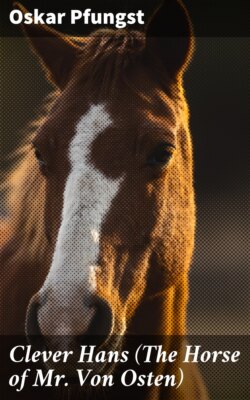Читать книгу Clever Hans (The Horse of Mr. Von Osten) - Oskar Pfungst - Страница 7
На сайте Литреса книга снята с продажи.
FOOTNOTES:
ОглавлениеTable of Contents
[A] "Frankfurter Zeitung" of September 22, 1904: "Concerning the question whether the horse was given some sort of aid, Professor Stumpf expressed himself freely. He said: 'We were careful to state in our report that the intentional use of the (actual) means of training, on the part of the horse's teacher, is out of the question, … nor are there involved any of the known kinds of unconscious, involuntary aids. Our task was completed after we had ascertained that no tricks or aids of the traditional sort were being employed'." After some remarks on unconscious habituation and self-training on the part of animals, the writer arrives at the conclusion that "the horse of Mr. von Osten has been educated by its master in the most round-about way, in accordance with a method suited for the development of human reasoning powers, hence in all good faith, to give correct responses by means of tapping with the foot. But what the horse really learned by this wearisome process was something quite different, something that was more in accord with his natural capacities—he learned to discover by purely sensory aids which are so near the threshold that they are imperceptible for us and even for the teacher, when he is expected to tap with his foot and when he is to come to rest."
[B] "From the productions of the 'thought-readers' we see how slight and seemingly insignificant the unconscious movements may be, which serve as signs for a sensitive re-agent. But in this case no contact is necessary. There would have to be some sort of visible or audible expression on the part of the questioner. No proof for this has as yet been advanced."
How any one possessing the power of logical thought could possibly infer from these words of mine (published in the above-mentioned article in the "Tag"), that I denied the possibility of the occurrence of visual signs, is to me incomprehensible. What I did deny, and still deny, is that up to that time any had been proven to occur.
[C] Since the present treatise is intended for the larger public, this brief resumé will probably be welcome to many.
[D] Ideas are copies of former sensations, feelings and other psychic experiences and retain also the accidental signs which belonged to those earlier experiences. They are images in the concrete, such as the memory of a certain horse in a certain definite situation … say a well fed, long-tailed one standing at a manger. A concept, on the other hand, is a mental construct which has its rise in ideas, or memory-images, in that their essential characteristics are abstracted. For this reason the concept has not a definite image-content. (Thus the thought of "horse" in general, is a concept. Not so the thought of a certain individual horse——that is an idea, with a definite image-content.)
[E] All examples mentioned are cited from extant works of various observers.
[F] The works referred to in the text are to be found listed on pages 267 ff.
